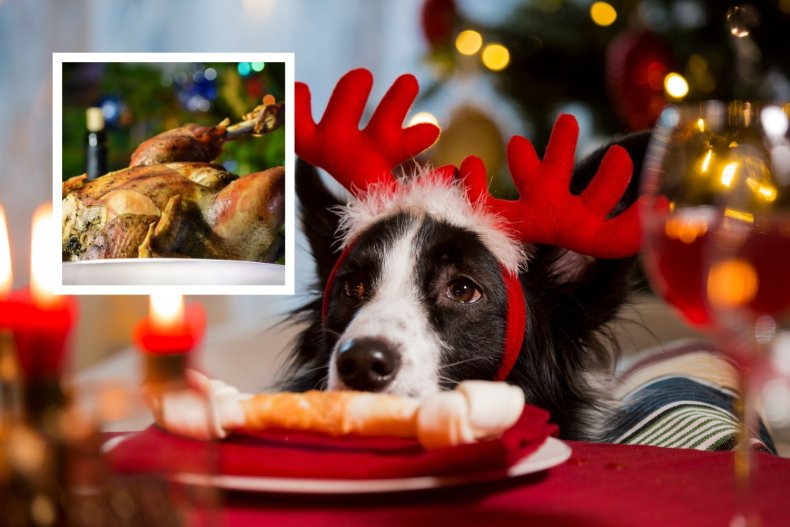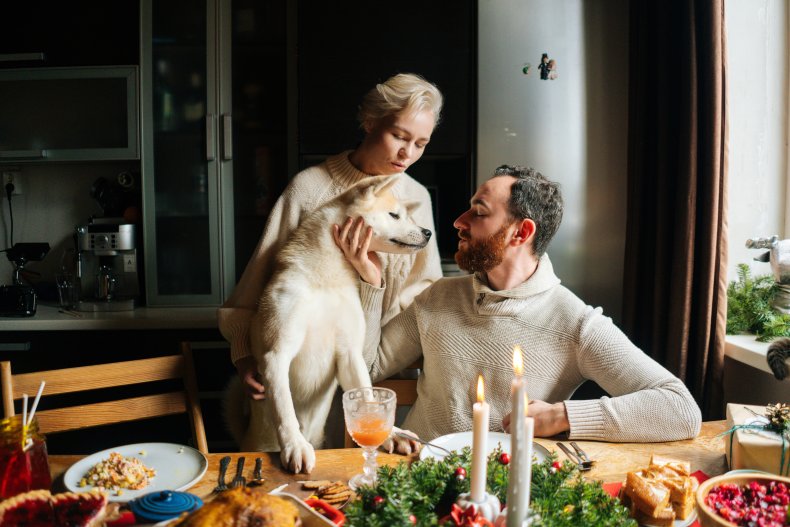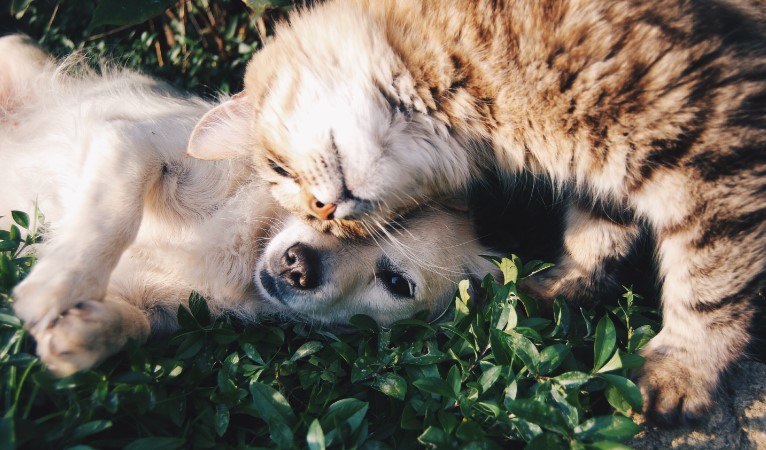What Christmas Food Can Dogs Eat, And What Should They Avoid?
Christmas is probably the most indulgent holiday of the year, and as a good dog parent, it’s only normal that you want to let your furbaby try some of your delicious festive dishes.
But, not all human foods are safe for dogs to eat. Some foods can cause digestive issues in dogs, while others are far more dangerous and can even result in death.
So if you want to treat your dog on this special day, you must make sure you know which foods are safe for it to eat and which foods are toxic instead and must be avoided completely.
Newsweek have spoken to veterinarians and dog experts to find out which items dogs should never eat. After all, we all want to avoid an unnecessary trip to the vet, who will most likely be swamped at a time we’re supposed to be at home celebrating!

Getty; Getty
What Christmas Dinner Items Are Bad For Dogs?
Dr. Patrik Holmboe, head veterinarian for Cooper Pet Care, told Newsweek that when talking about Christmas foods that are or are not safe for dogs, it’s good to split the foods into three categories:
- Foods that are toxic/dangerous and should absolutely not be fed at all
- Foods that are certainly not healthy, but if fed in small quantities won’t hurt
- Safe foods, which can be fed in larger amounts if the dog likes it, of course, using common sense with how much to feed.
We all indulge over the holidays, and it can be tempting to give our pets an extra treat or two, but be careful what you feed your dog, as many of our leftovers can be dangerous for them.
1. Chocolate
Chocolate is toxic to dogs, and the darker the chocolate, the more dangerous it is. That’s because it contains a toxin called theobromine that dogs cannot metabolize as well as people can, which makes them more sensitive to the chemicals’ effects.
Baking chocolate and gourmet dark chocolate are highly concentrated and contain 130-450 mg of theobromine per ounce. Common milk chocolate contains about 44-58 mg/ounce, and white chocolate rarely poses any threat of chocolate poisoning with only 0.25 mg of theobromine per ounce of chocolate.
To put this in perspective, a medium-sized dog weighing 50 pounds would only need to eat one ounce of baker’s chocolate, or nine ounces of milk chocolate, to potentially show signs of poisoning.
2. Onions, Chives, Garlic, Leeks, or Shallots
This family of plants is also toxic to dogs, said Holmboe, adding that many food items are made with these ingredients, so you must be careful before feeding your dog a slice of meat pie.
3. Bones Of Any Kind, Especially Cooked Bones
Bones can cause all sorts of issues to the gastrointestinal tract. They can splinter and can get stuck or perforate the esophagus, stomach, or intestines. And are also among the leading causes of constipation too.
4. Raisins and Grapes
Dr. Jamie Richardson, the Head of Veterinary Medicine at Small Door Vet, told Newsweek that eating even a few grapes or raisins can lead to acute kidney failure in dogs, so you must be careful not to leave any lying around, and watch out for cakes, bread and stuffing mixtures that might contain them.
5. Products Containing Xylitol
Xylitol is an artificial sweetener found in sugar-free products such as cranberry sauce, peanut butter, and ketchup, which can cause liver damage in dogs.
6. Macadamia Nuts and Walnuts
Both macadamia nuts and walnuts can be toxic to dogs. Macadamia nuts are a very fatty food, and dogs in rare cases may experience inflammation of the pancreas, and pancreatitis, after eating them.
If your pet eats macadamia nuts, you should contact your local veterinarian right away. Your dog will need care at a veterinary hospital if he starts shaking constantly, has a high fever, or becomes unable to walk.
7. Fatty Meats
According to Dr. Richardson, even small amounts of fatty meat can cause dog pancreatitis, a potentially fatal disease. Other high-fat foods or foods cooked in lots of oil, also pose risks for pancreatitis, so keep them well out of reach of pets.
8. Alcohol
Alcohol is also off-limits. That’s because dogs just aren’t built to process it like we are, and they’re also a lot smaller than we are, so the risk of alcohol poisoning is greater. This is why giving your pet even a small sip of eggnog is not a good idea.
9. Raw Yeast Dough
Raw yeast dough can cause painful bloating and potential ethanol poisoning in pets, so ensure any dough is kept well out of reach when you’re baking.
10. Pies
Any form of baked or dessert items such as pies.
11. Cheese
Cheese is generally safe for dogs, but since most pets are lactose intolerant, they could have a little gastrointestinal upset with cheese. Hard cheeses have less lactose and are a better option.
If you’re having a cheese platter, it’s safe to give your pet a very small amount of cheese, but make sure not to give them too much of it, as the high-fat content in it could potentially cause your dog pancreatitis.
12. Gravy
Gravy typically contains lots of salt, and may also contain additives such as onion and garlic that are poisonous to our pets, so make sure to check the ingredients before adding a splash of gravy to your pet’s food bowl.

Getty Images
What Food Can You Feed Your Dog From A Christmas Dinner
Most foods that are healthy for humans, are often, but not always, healthy for dogs too.
1. Most vegetables
Most vegetables are safe, including broccoli, cauliflower, carrots, green beans, and sweet potato, as long as they don’t have too much butter, salt, or other seasonings (like onion and garlic).
But Dr. Rochardson warns veggies can cause some gas, especially broccoli and cauliflower, so you may smell some stinky toots!
2. Potatoes
Potatoes can be fine but again be mindful of what else is included in a potato dish, as there are often onions, garlic, spices, or cheese as well.
3. Lean meat
Lean chicken or turkey meats are fine in moderation, assuming there are no bones or spices.
A small amount of unseasoned white meat such as turkey breast is a great treat for dogs, as long as you steer clear of skin and bones. However, turkey skin is very high in fat, which can sometimes cause life-threatening pancreatitis in both dogs when ingested in large quantities.
Alison Frost, ProDog Raw’s consultant nutritionist told Newsweek that other safe lean bits you can safely share with your dog include beef, and lamb, which are absolutely fine in moderation.
She said: “Just be sure to avoid meats that are high in salt. Similarly, cranberries are a great source of nutrients and antioxidants for dogs, whilst raw and cooked eggs are a perfectly healthy treat.”
4. Salmon
Slamon in small quantities is also a safe snack for your dog to munch on, but as with other foods, make sure it’s not too salty and doesn’t contain any extra seasonings like garlic or onion.
5. Pumpkin
Plain pumpkin is a safe, nutrient-dense, and high-fiber snack for dogs. However, before giving it to your pet, you must make sure that it doesn’t have any sort of spices or seasoning, and that it’s been cooked and chopped into small pieces.
You should also remove the skin, leaves, stems, and seeds, as they can be a choking hazard. Avoid pumpkin pie filling due to the high sugar content.
6. Most Fruits
Most fruits are safe for your dog, said Dr. Richardson, with the exception of grapes, raisins, and currants. “Fruits make for a great and nutritious treat for your pet; they work particularly well as training treats. Just ensure you remove any pits from stone fruits, as they’re a choking hazard, and don’t let them eat apple cores.”
7. Homemade Bone Broth
Something else your dog will be drooling over this Christmas according to Frost is homemade bone broth.
To make it, she said: “Put your turkey carcass in a pot, fill it with water, add a spoonful of apple cider vinegar, simmer for 10 hours, cool in the fridge, skim off any fat on the top, and voila!” (Of course, with the broth you must make sure you’ve removed all the bones before serving it to your dog).
What To Do If Your Dog Eats Something That’s Bad For Them
According to Dr. Holmboe, it really comes down to the specific situation. For example, if you have a small dog that ate a large amount of chocolate, this is absolutely an emergency, and you should get your dog to the vet clinic as soon as possible.
If on the other hand, your labrador ate a baked potato, this is less likely to be a major problem.
Warning signs of poisoning in pets include sudden changes in behavior: pain, vomiting, and diarrhea. It’s always best to call your trusted veterinarian and make sure your dog is safe.
You can also call the ASPCA Poison Control Hotline at (888) 426-4435 for advice 24/7.
Whether you’re traveling away from home or staying put this holiday season, veterinarians advise you to keep your local 24/7 emergency veterinarian’s details handy, just in case.
And if your pet has any chronic conditions, be sure to take their health records with you on your travels.







